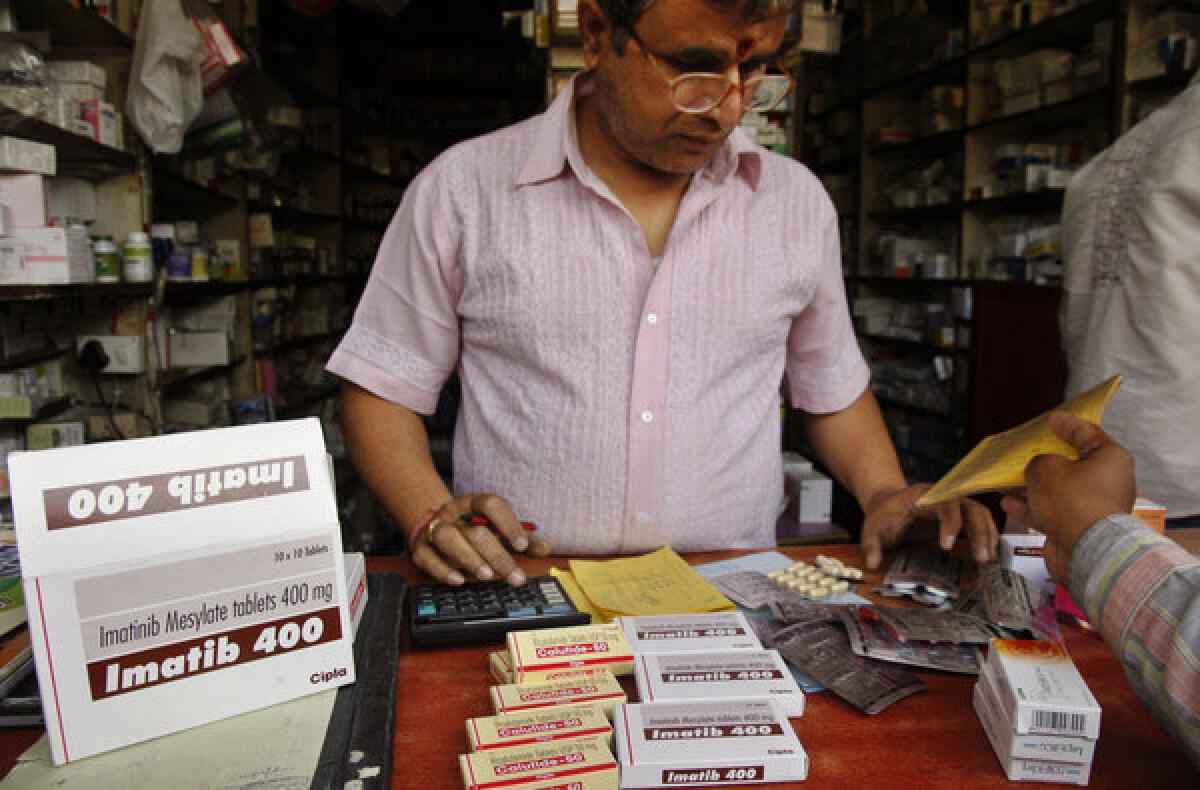Indian court ruling hailed as victory for generic drugs

- Share via
The Indian Supreme Court ruled Monday that a Swiss drug company cannot patent a medicine used to treat a rare form of leukemia, in a decision with global implications for generic drugs.
The court ruled that Glivec, the drug developed by Novartis, was not different enough from drugs already on the market, touting an Indian law that sets stiff requirements for patenting new medicines.
Activists and aid groups heralded the Monday decision as a crucial victory for impoverished patients worldwide who rely on India for affordable generic medicines. India has set tough rules to prevent companies from “evergreening” – tweaking drugs slightly to keep them perpetually under patent. Generics can be produced legally only after patents expire.
If the Indian court had allowed the Glivec patent, it would have paved the way to patenting many other drugs for HIV/AIDS and other ailments now produced cheaply in India as generics, said Tahir Amin, co-founder of the Initiative for Medicines, Access and Knowledge.
“This is more than just this particular drug – it affects all the other cases going on” in India, Amin said. Even beyond Indian courts, “some countries will look at this and take strength from the fact that India has stood its ground.”
The legal case hinged on whether Glivec was truly a new drug. Novartis argued that putting the chemical compound in crystalline form was “a breakthrough.” Indian courts were unconvinced.
Novartis had already been turned down for the patent and lost earlier challenges to the decision in Indian courts after it first started the legal battle seven years ago. It pointed out that the drug had already been patented in China, Russia and dozens of other countries. Such protection helps encourage investment in new medicines, it argued.
“The ruling is a setback for patients that will hinder medical progress for diseases without effective treatment options,” Ranjit Shahani, vice chairman of Novartis India Limited, said in a statement Monday. The company says it will be “cautious” with its future investments in drug development in India.
“We will pursue patent protection for any new medicines before they become available on the Indian market,” spokeswoman Julie Masow said in an email to The Times on Monday.
The U.S. Chamber of Commerce said Monday that the decision would hinder businesses from investing in medical and technological advancements, especially in the pharmaceutical and medical sectors, “which require extensive up-front research and development expenses and exhaustive resources in time and manpower.”
Glivec costs roughly $2,600 a month, compared with less than $200 monthly for generic versions available in India, according to the latest information available from Doctors Without Borders. However, Novartis already provides Glivec for free to 95% of Indian patients who need it, the company said Monday.
Despite its objections to the ruling, Novartis said it was unlikely to challenge the court decision. Now that the Indian Supreme Court has decided the case, Amin said the next battleground for generic drugs will be a Pacific free trade agreement under negotiation among a long list of countries, including the U.S., Canada, Mexico, Vietnam and Malaysia.
Leaked versions of the agreement would require countries to set a lower bar for patenting medicines, barring stiff laws like India has, according to Doctors Without Borders. The group warned that such rules would make it much harder for aid groups to use generics to treat patients in countries that join the pact.
“It’s the worst trade agreement we’ve ever seen between the U.S. and developing countries,” said Judit Rius, U.S. manager of the Doctors Without Borders Access Campaign.
The U.S. got “a great deal of feedback on our early proposals” and was “carefully reflecting,” then-U.S. Trade Representative Ron Kirk said in July after aid groups objected to the plans. “The Obama administration intends to ensure that access to medicines is as robust as in prior administrations.”
The Office of the U.S. Trade Representative did not respond immediately to a request for additional comment Monday. The next round of trade agreement negotiations is slated to happen next month in Peru.
ALSO:
North Korea, in break from bluster, elevates reformer
Syria: Intense shelling by government is reported in Aleppo
Female tourists avoid India after New Delhi rape, survey finds
More to Read
Sign up for Essential California
The most important California stories and recommendations in your inbox every morning.
You may occasionally receive promotional content from the Los Angeles Times.









